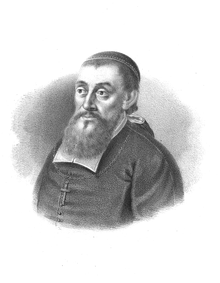Wojciech Baranowski
Wojciech Baranowski-Jastrzębiec , also Adalbert Baranowski (* 1548 in Baranowo near Kruszwica , Poland ; † September 23, 1615 in Łowicz ) was Archbishop of Gniezno and Primate of Poland .
resume
Baranowski was self-taught. In 1581 he was ordained a priest . As the personal secretary of King Stefan Báthory , he accompanied him on the campaign against Russia (Battle of Pskov , 1581). Also in that year he was appointed Grand Secretary of the Reich. In 1584 he became Bishop of Przemyśl , the episcopal ordination donated to him on April 23, 1585 Piotr Myszkowski , Bishop of Cracow ; Co-consecrators were the Bishop of Kamieniec , Marcin Białobrzeski , and Jakub Milewski , auxiliary bishop in Cracow. In 1585 he had already risen to become Vice Chancellor of the Crown. In 1587 he received the newly elected King Sigismund III on behalf of the Polish Senate . Wasa on a ship in Danzig , where he tried to get the king to sign the pacta conventa (including removing the king's promise to incorporate Estonia into the Polish Empire). In 1590 he was appointed bishop of Płock and in 1591 resigned from the post of vice chancellor. From 1595 to 1596 he was the Polish king's envoy to Pope Clement VIII in Rome . His Hofkapellmeister Zielenski may have accompanied him on this trip . In 1609 he became Bishop of Kujawia for a short time , only to become Archbishop of Gniezno and thus Primate of Poland and Interrex (Poland) in the same year . He held this post until his death.
There is a report by the Italian master of ceremonies of the papal nuncio , Cardinal Enrico Caetani (1550–1599): Giovanni Paolo Mucante of February 24, 1597 about a festive service that was celebrated by Baranowski in the St. John's Cathedral in Warsaw . Mucante describes Baranowski, who at that moment was still Bishop of Płock , as a dignified and highly respected prelate and as a pious, loyal and devoted person. He should also:
“ Have sung very well, using the Roman pattern, which other Poles cannot do so easily; because last year he was in Rome and celebrated a high mass in the chapel of His Holiness on the third Sunday before Easter, so he can give his voice the right tone, avoiding the annoying harshness and uneven tone that usually all Poles use . "
Act
Baranowski's special role in Polish culture is due to his patronage in the field of music. It is known that he was the employer of the first “baroque” composer and organist in Polish musical history, Mikołaj Toreński , and that he made the printing of his works possible in Venice . His court orchestra, which he maintained in his private residence, must have been of a very high standard, since it was apparently able to perform Zielński's works.
literature
- Giovanni Paolo Mucante: I due soggiorni del card. Legato E. Caetani a Varsavia (1596-1597). [...] Firenze 1982.
- W. Tygielski: Wlosi w Polsce. Warszawa 2006, pp. 477-478.
Web links
- Entry on Wojciech Baranowski on catholic-hierarchy.org ; Retrieved July 26, 2016.
Individual evidence
- ↑ Quoted from Damian J. Schwider: D. Nicolaus Zielenski. A Polish composer between the 16th and 17th centuries. Herbert Utz Verlag, Munich 2006, ISBN 978-3-8316-0819-5 , p. 18
| predecessor | Office | successor |
|---|---|---|
| Bernard Maciejowski |
Archbishop of Gniezno 1608–1615 |
Wawrzyniec Gembicki |
| Peter Tilicki |
Bishop of Kuyavian 1607–1608 |
Maciej Pstrokoński |
| Adam Dunin Wolski |
Bishop of Plock 1791–1607 |
Marcin Szyszkowski |
| Jan Boruchowski |
Bishop of Przemyśl 1585–1791 |
Wawrzyniec Grzymała Goślicki |
| personal data | |
|---|---|
| SURNAME | Baranowski, Wojciech |
| ALTERNATIVE NAMES | Baranowski-Jastrzębiec, Wojciech; Baranowski, Adalbert |
| BRIEF DESCRIPTION | Polish Catholic bishop |
| DATE OF BIRTH | 1548 |
| PLACE OF BIRTH | Baranowo (Powiat Inowrocławski) near Kruszwica , Poland |
| DATE OF DEATH | September 23, 1615 |
| Place of death | Łowicz |
